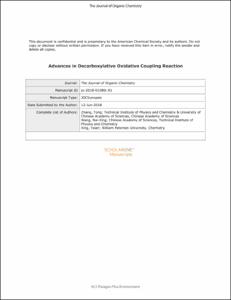Please use this identifier to cite or link to this item:
http://hdl.handle.net/20.500.12164/145Full metadata record
| DC Field | Value | Language |
|---|---|---|
| dc.contributor.author | Zhang, Tong | - |
| dc.contributor.author | Wang, Nai-Xing | - |
| dc.contributor.author | Xing, Yalan | - |
| dc.date.accessioned | 2018-12-06T22:28:33Z | - |
| dc.date.available | 2018-12-06T22:28:33Z | - |
| dc.date.issued | 2018 | - |
| dc.identifier.citation | T. Zhang, N. Wang, Y. Xing. “Advances in Decarboxylative Oxidative Coupling Reaction” J. Org. Chem. 2018, 83, 7559-7565. | en_US |
| dc.identifier.issn | 1520-6904 | - |
| dc.identifier.uri | https://doi.org/10.1021/acs.joc.8b01080 | - |
| dc.identifier.uri | http://hdl.handle.net/20.500.12164/145 | - |
| dc.description.abstract | Since carboxylic acid derivatives are commercially available, nontoxic, cheap, and normally stable to air and moisture, carboxylic acid derivatives are ideal reactants for synthetic strategy. In recent years, decarboxylative oxidative coupling reactions, which normally involve direct C–H bond activation, have attracted more and more interest from the synthetic community. Compared with conventional methods, this strategy is more environmentally friendly and step-economic. This review mainly focuses on recent advances of the decarboxylative oxidative coupling reaction. | en_US |
| dc.description.sponsorship | Natural Science Foundation of China (21572240) | en_US |
| dc.language.iso | en_US | en_US |
| dc.publisher | American Chemical Society | en_US |
| dc.rights.uri | http://rightsstatements.org/vocab/InC/1.0/ | en_US |
| dc.subject | Chemistry | en_US |
| dc.subject.lcsh | Carboxylic acids | en_US |
| dc.subject.lcsh | Chemical reactions | en_US |
| dc.subject.lcsh | Carbon compounds | en_US |
| dc.title | Advances in Decarboxylative Oxidative Coupling Reaction | en_US |
| dc.type | preprint | en_US |
| Appears in Collections: | Chemistry | |
Files in This Item:
| File | Description | Size | Format | |
|---|---|---|---|---|
| jo8b01080.pdf | Accepted Manuscript | 398.5 kB | Adobe PDF |  View/Open |
Items in DSpace are protected by copyright, with all rights reserved, unless otherwise indicated.
